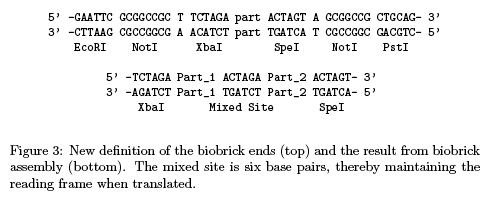Help:Assembly standard 23
< Back to Assembly standard 23 parts
Pam Silver's lab has developed Assembly standard 23, often called the Silver standard, for assembling protein domains. It relies on shortening the BioBrick prefix and suffix each by 1 base pair such that the resulting SpeI-XbaI scar is only 6 base pairs long and protein domains can be assembled in frame.
As shown in figure 3 (right), Assembly standard 23 results in the inclusion of a Thr-Arg (ACT AGA) two amino acid junction between protein domains.
One disadvantage of the Assembly standard 23 is that the codon AGA which encodes Arginine is a rare codon in E. coli. Rare codons can prevent over-expression of proteins in E. coli.
See [http://openwetware.org/wiki/The_BioBricks_Foundation:Standards/Technical/Formats The BioBricks Foundation wiki] for a discussion and comparison of different technical standards.
Advantages
- in-frame fusion of protein parts
- restriction-compatible to the original BioBrick assembly standard parts -- no new enzymes
- also protein parts can, theoretically, be fused N-terminally to original BioBrick assembly standard protein parts, as long as the frameshift is corrected by an adapter part
- used by several iGEM teams
Disadvantages
- Arg in scar can be problematic
- N-terminal Thr-Arg = destabilization signal (N-end rule)
- Dam methylation blocks cloning when prefix is followed by "TC"
- unexpected side-effects for users not aware of the shortened prefix/suffix
- non-coding parts may be not functionally compatible due to the changed bp distance
- frameshift with respect to what is expected from protein coding original BioBrick assembly standard parts
- not possible to preserve native protein start (but equivalent to original BioBrick assembly standard coding part could be constructed)
References
A New BioBrick Assembly Strategy Designed for Facile Protein Engineering
MIT SBWG Technical Reports, 2006 Apr 20
Ira Philips, Pam Silver
[http://hdl.handle.net/1721.1/32535 URL] (open access!)

